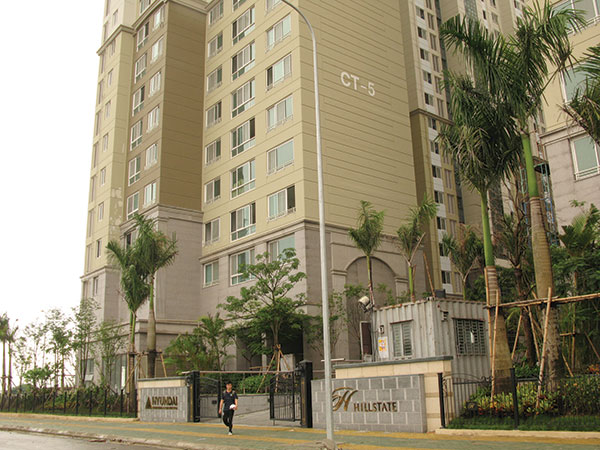‘Cheated’ buyers spark disputes

Contracts that are unfairly slanted in the interest of developers have sparked conflict
Disagreements between property developers and residents have centred around management fees, usage of public facilities, and property valuations.
Some of the more prominent were the Keangnam Palace, Golden Westlake, and Sky City Towers.
Recent conflicts included tempers flaring at the Sparks residential complex in Hanoi after customers said they were displeased with the calculations of space.
The developer did not cut out heavy duty columns and common utility rooms and spaces from the payable area for buyers.
A similar situation arose at the 928 unit Hyundai Hillstate project after buyers refused to pay for areas taken up by walls and utilities.
General director of PMC Nguyen Hong Minh said misunderstandings about the definition of public and private area ownership are often the main cause of disputes.
Other conflicts, such as at the Golden Westlake or Keangnam Palace, have been over management and parking fees.
At Pacific Place, another high-end residential project, residents requested the Vietsing medical clinic in the basement and the Rooftop restaurant and bar on the roof be closed, and were unhappy about the intrusion from three elevators being added to the adjoining office building.
Residents were concerned about medical waste from the clinic, complained that the bar was too noisy despite closing before midnight, and criticised the structural changes because of the new lifts.
According to Tran Huu Huynh, chairman of the Vietnam International Arbitration Centre, property disputes have become more prevalent and specific. This has resulted in constant battling between developers and residents.
Former Deputy Minister of Natural Resources and Environment Dang Hung Vo added that the disputes were becoming increasingly complicated, to the point that resolution was impossible.
Vo blamed the problems on unclear and overlapping laws and regulations.
Nguyen Truc Hien, an executive partner from law firm Vilaf Hong Duc said many developers draw up contracts that prioritise their interests and push risks and disadvantages on to buyers.
Lawyer Phan Vu Anh, former head of the Legal and External Affairs Department from Vinaconex agreed with Hien, saying that property contracts highly favoured developers.
“Buyers are signing contracts they don’t understand and are being cheated,” Anh said.
Hien said the legal system at current did not have the comprehensive regulations needed to protect buyers’ rights and that supervisory bodies were incompetent.
Dao Ngoc Chuyen, a lawyer and arbitrator from the International Arbitration Centre agreed that poor management of the real estate market was to blame.
“Over the last decade, speculation has been the driving force behind the market and many businesses with little or no experience in property development jumped in. This inexperience has caused numerous disputes,” Chuyen added.
Before conflicts can be resolved, Vo said buyers’ rights need to be protected and there needs to be detailed guidelines for contracts that are fair to both developers and buyers.
“This is a complicated issue, but it must be solved and we should start now. All sides [developers, buyers, policy makers] need to get serious and recognise that everyone will benefit from mapping out solutions,” Vo concluded.
What the stars mean:
★ Poor ★ ★ Promising ★★★ Good ★★★★ Very good ★★★★★ Exceptional
Latest News
More News
- An Phat 5 Industrial Park targets ESG-driven investors in Hai Phong (January 26, 2026 | 08:30)
- Decree opens incentives for green urban development (January 24, 2026 | 11:18)
- Public investment is reshaping real estate’s role in Vietnam (January 21, 2026 | 10:04)
- Ho Chi Minh City seeks investor to revive Binh Quoi–Thanh Da project (January 19, 2026 | 11:58)
- Sun Group launches construction of Rach Chiec sports complex (January 16, 2026 | 16:17)
- CEO Group breaks ground on first industrial park in Haiphong Free Trade Zone (January 15, 2026 | 15:47)
- BRIGHTPARK Entertainment Complex opens in Ninh Binh (January 12, 2026 | 14:27)
- Ho Chi Minh City's industrial parks top $5.3 billion investment in 2025 (January 06, 2026 | 08:38)
- Why Vietnam must build a global strategy for its construction industry (December 31, 2025 | 18:57)
- Housing operations must be effective (December 29, 2025 | 10:00)
















 Mobile Version
Mobile Version